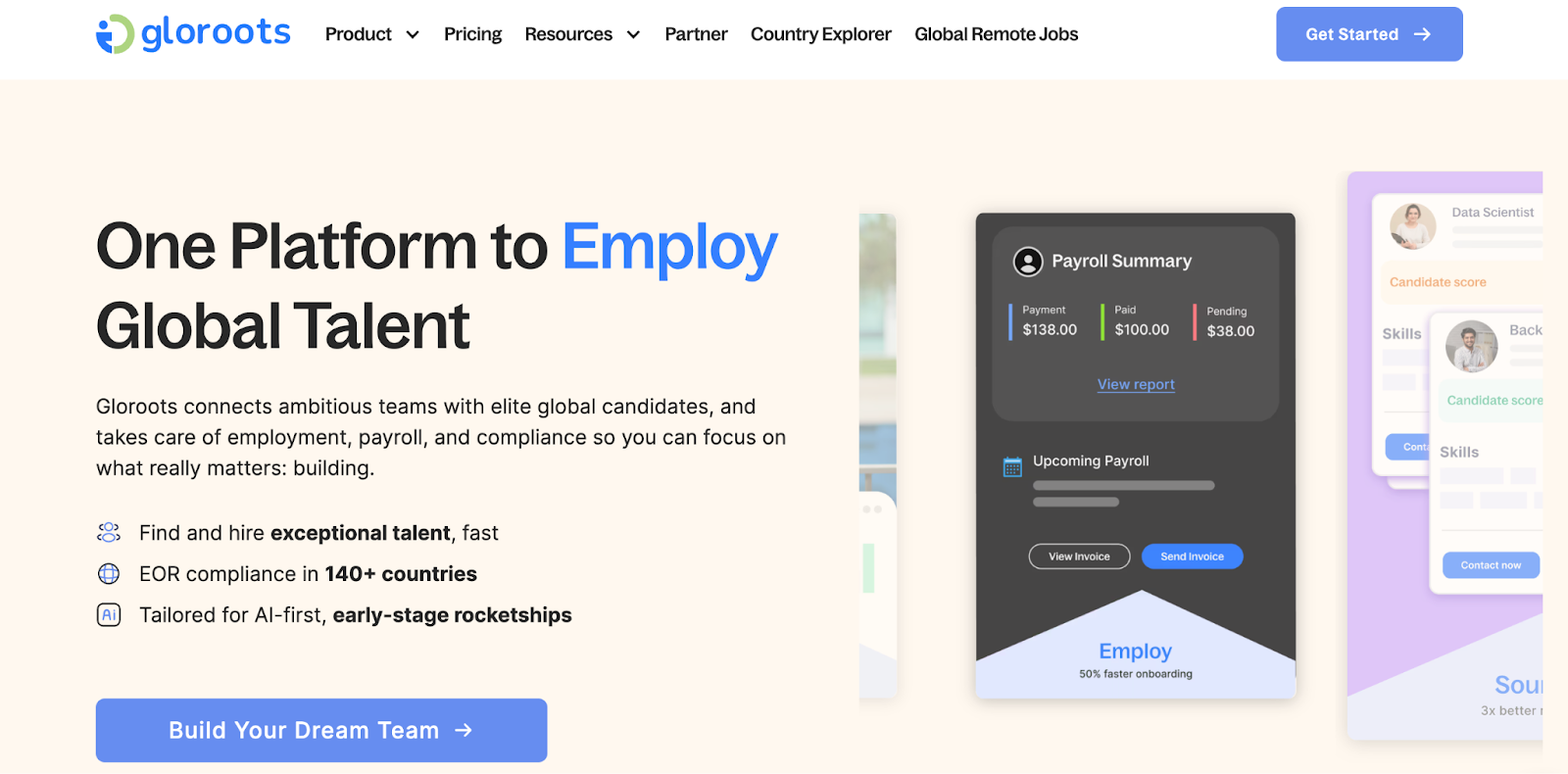- Global HR in international business must navigate complex labor laws, payroll rules, and compliance requirements across multiple countries.
- Cultural differences and time zone gaps make communication, engagement, and leadership alignment more challenging at scale.
- Managing global talent, compensation, and mobility requires balancing consistency with local market expectations.
- Organizations that centralize core HR processes while localizing policies are better positioned to overcome global HR challenges.
Expanding your business across borders can open up exciting opportunities. Companies gain access to new markets, a diverse workforce, and talented professionals from around the world. This global reach can help drive growth, innovation, and long-term success.
However, expanding internationally also comes with challenges. HR teams must manage employees spread across different countries, each with its own labor laws, regulations, and cultural expectations. Ensuring compliance while keeping employees engaged can be tricky.
Managing a global workforce goes beyond just following the rules. HR departments need to coordinate payroll, benefits, hiring, and onboarding across time zones. They also need to maintain a consistent company culture and clear communication across teams.
In this article, we’ll look at the top five challenges HR professionals face when managing an international workforce. We’ll also explore how partnering with an Employer of Record, or EOR, can make global HR management easier and more efficient.
What is Global HR Management?
Global HR management is the strategic management of a distributed workforce operating across different countries. It aims to optimize HR policies and strategies to align with the diverse workforce dynamics, cultural differences, and legal and regulatory compliance.
Effective global HR management requires a deep understanding of local labor laws, cultural nuances, and market dynamics to drive organizational success in a rapidly evolving global economy. However, companies face a myriad of global HR challenges in effectively managing their workforce. It is essential to understand and address these challenges to utilize the potential of the diverse workforce, drive organizational growth, and maintain a competitive edge in the global market.
10 Global Human Resource Issues & Challenges of International Companies
Managing a global workforce comes with both opportunities and challenges. HR leaders must balance compliance with local laws, meet diverse employee expectations, and maintain efficiency while fostering a unified company culture.
Below are the key global HR challenges international organizations commonly face.
1. Legal Compliance with International Labor Laws
Every country operates under its own labor framework covering employment contracts, taxes, benefits, and termination policies. For global teams, keeping up with these evolving regulations can be overwhelming. Mistakes in compliance can lead to legal disputes, penalties, or reputational damage.
Working with local legal experts or a global Employer of Record (EOR) like Gloroots helps businesses stay compliant. They handle documentation, monitor policy changes, and ensure your global workforce meets all labor and tax requirements seamlessly.
2. Talent Hiring and Onboarding
Hiring across borders can be challenging due to language barriers, different hiring laws, and logistical hurdles. Without proper coordination, candidates may have inconsistent onboarding experiences.
Adopting digital hiring tools and global HR platforms ensures smooth coordination, transparent communication, and faster onboarding. EOR services simplify everything from contracts and payroll setup to compliance, helping new hires feel part of the team from day one.
3. Adjusting Compensation to Different Local Standards
Pay structures and benefits vary widely depending on the cost of living, local taxes, and currency fluctuations. Creating fair and competitive compensation packages across markets is a constant balancing act.
To stay equitable and attractive, businesses need region-specific pay scales supported by accurate payroll systems. Global payroll solutions help automate payments, handle conversions, and ensure employees are paid accurately and on time.
4. Time zone differences
Teams spread across multiple time zones often face communication gaps, delayed responses, and missed deadlines. Over time, this can affect team morale and productivity.
To address these challenges, HR teams must implement global HR strategies that prioritize effective communication, leverage technology tools to facilitate collaboration across time zones and establish clear guidelines for managing work hours and expectations to unite the global workforce.
5. Cultural Differences
International teams bring unique perspectives and working styles, but cultural misunderstandings can quickly create tension. Differences in communication, hierarchy, and feedback can affect collaboration.
Building cultural awareness through diversity training and open dialogue helps bridge these gaps. Encouraging inclusivity and recognizing local customs can foster stronger global team connections.
6. Employee Engagement and Retention
Keeping employees engaged across borders is harder when distance limits visibility and connection. Without consistent engagement, global workers may feel isolated or undervalued.
Companies can strengthen engagement by offering personalized recognition, growth opportunities, and consistent communication. When employees feel heard and supported, retention rates improve significantly.
7. Remote Work Infrastructure and Technology
A distributed workforce depends heavily on technology for communication, collaboration, and performance management. Outdated or unreliable tools can quickly stall productivity.
Investing in cloud-based systems, secure communication tools, and project management software helps teams stay connected. A unified tech stack ensures everyone works smoothly, no matter where they’re located.
8. Data Privacy and Security Compliance
With growing digitalization, managing employee data responsibly is more critical than ever. Regulations like GDPR and PDPA impose strict rules, and even minor breaches can be costly.
Organizations must adopt secure data management systems and clear privacy policies that align with local laws. Using encrypted tools and limiting data access protects both employees and company integrity.
9. Training and Skill Development Across Borders
Inconsistent access to learning resources can limit employee growth and performance. Global employees often need training tailored to local contexts to stay relevant.
Implementing online learning platforms with localized content ensures equal learning opportunities for all. This helps build a more capable, future-ready workforce across regions.
10. Managing Global Performance and Appraisals
Evaluating international employees fairly can be difficult when expectations, work styles, and cultural norms differ. A lack of standardized processes can create bias or misalignment.
Companies that use transparent, metric-based performance systems supported by global HR software can ensure fairness. Regular feedback and consistent criteria help teams feel motivated and valued across borders.
Key Strategies To Address International HR Challenges
1. Establish global HR policies
Create a comprehensive HR strategy that aligns with business objectives and takes into account the varied needs and expectations of employees from different geographical locations. The strategy should also account for each market's unique cultural, legal, and operational nuances. By standardizing HR practices, businesses can foster consistency and fairness while maintaining cultural diversity within the organization.
2. Implement cross-cultural training
Cultural intelligence is critical for navigating cross-cultural interactions and fostering collaboration. HR professionals should train their employees and provide opportunities to enhance their cultural awareness and cross-cultural communication skills. This mitigates misunderstandings among team members and improves teamwork. Also, building cross-cultural teams and adopting inclusive leadership practices maximize the potential of diverse talents.
3. Leverage HR technology platforms
Utilizing centralized HR platforms helps international employees collaborate, communicate, and engage effectively across different time zones. Invest in cloud-based HR systems, an agile HR Stack that can include communication software like Zoom and Teams, a project management system, payroll solutions, and an HCM or HRIS to improve data management.
4. Optimize compensation and benefits
Designing competitive and equitable compensation and benefits packages is necessary to attract and retain talents in diverse markets. HRs should ensure that the salary structures, incentive programs, and benefits packages align with the industry standards, including the cost-of-living standards. Offering flexible benefits in consideration of the needs of the employees enhances employee satisfaction and engagement with the company.
5. Build strategic partnerships
Compliance with local labor laws and regulations is a non-negotiable aspect of global HR management. By collaborating with local experts and legal advisors with expertise in international labor laws, HR departments can effectively ensure compliance and mitigate legal risks.
Additionally, establishing relationships with Employer of Record (EOR) providers can offer a reliable solution for managing payroll, compliance, and administrative tasks in unfamiliar jurisdictions. The expertise of these strategic partners enables organizations to tap into local insights, address legal complexities, and confidently streamline HR operations.
How Can An Employer Of Record (EOR) Address Global HR Challenges?
By partnering with an EOR, companies can transfer significant HR risks to a trusted third party, safeguarding their interests and financial stability in the global markets.
1. Faster Onboarding Processes
EORs facilitate the swift onboarding of global employees in just a matter of a few days or weeks without setting up a legal entity in a different country. They take up all the administrative tasks, such as payroll setup, benefits enrollment, and tax documentation, and alleviate the administrative burden for the HR teams. Also, EORs help acquire visas, work permits, and work authorization for employees working in foreign jurisdictions. Their established procedures and technology platforms expedite the transition of new hires into the organization, reducing the time and effort required for onboarding.
2. Assured Legal Compliance
EORs play a crucial role in mitigating risks associated with global HR operations by ensuring the company remains compliant with local labor laws and regulations. This reduces the likelihood of penalties and legal disputes due to non-compliance. With their compliance expertise, businesses can confidently expand into new markets without the burden of navigating intricate regulatory frameworks themselves.
3. Payroll Administration
EORs ensure that the employees’ payroll complies with the country's laws and regulations. Companies can avoid the burden of calculating and withholding statutory deductions from pay, such as taxes, pensions, and health insurance. , as EORs handle these critical details and ensure on-time payment processing. Also, they pay employees in their local currency, eliminating the transaction costs involved in converting currencies.
4. Flexibility
EORs offer scalability and flexibility, allowing you to scale your workforce up or down as per your business needs. Whether companies are scaling their operations globally, launching short-term projects, or adjusting staffing levels, EORs can quickly adapt their services to meet evolving requirements. This agility optimizes human capital management without being constrained by traditional hiring processes or long-term commitments.
How Gloroots can help Overcome International HR Challenges?
Global HR management does not have to be complicated. Gloroots helps companies overcome key challenges such as compliance, onboarding, payroll, time zones, and employee engagement all through one platform.

- Hire and onboard globally with ease.
Gloroots speeds up onboarding and manages all local requirements like benefits, contracts, and tax documentation, so you can hire talent anywhere without setting up entities. - Stay compliant in every country.
Our experts monitor local labor laws and tax regulations across 140+ countries, helping your business avoid penalties and stay legally secure. - Simplify payroll and compensation.
Pay teams accurately in their local currencies and stay compliant with regional laws. Automated systems reduce errors and save time. - Support your distributed teams.
Gloroots provides tools to manage collaboration, engagement, and performance across time zones while maintaining a strong company culture. - Protect your data.
We maintain strict security and privacy standards so that all employee information stays safe and compliant with global data laws.
With Gloroots, you can expand confidently and manage your workforce anywhere in the world without the complexity.
Book a Demo to discover how Gloroots can simplify your global HR operations.
















